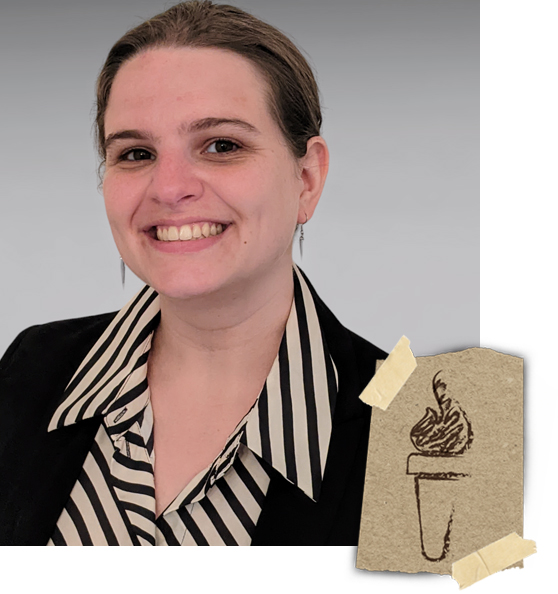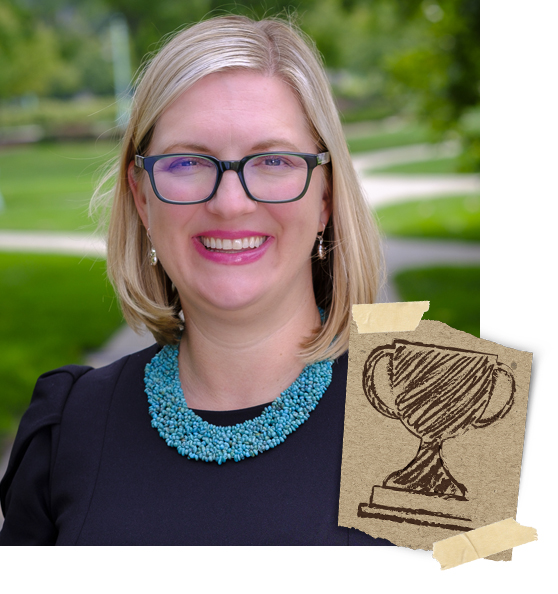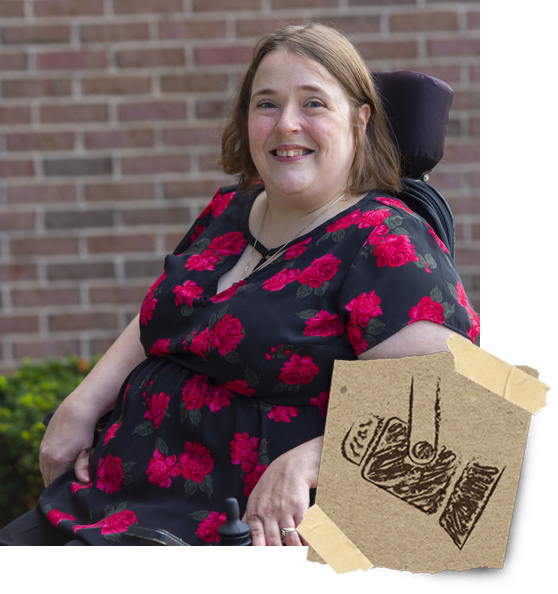Diversity Torch: Livy Drexler
July 23, 2024 - Emily Jodway
 This July, we celebrate Disability Independence Day, recognized each year on July 26th to coincide with the 1990 signing of the Americans with Disabilities Act. The Americans with Disabilities Act established disability rights as civil rights, ensuring equal opportunities for individuals with disabilities while also pledging to provide better accessibility and reasonable accommodations for those individuals.
This July, we celebrate Disability Independence Day, recognized each year on July 26th to coincide with the 1990 signing of the Americans with Disabilities Act. The Americans with Disabilities Act established disability rights as civil rights, ensuring equal opportunities for individuals with disabilities while also pledging to provide better accessibility and reasonable accommodations for those individuals.
Our Diversity Torch this month is on Livy Drexler, a PhD student in the anthropology department examining Native American children in special education through a culturally ecological lens. Drexler's interest in disability studies and special education began at a young age; Drexler grew up in Chesaning, Michigan with two autistic younger brothers. Drexler and their parents had their hands full, with one brother presenting as more independent and high-functioning, while Drexler's other brother is nonverbal and required almost constant care and supervision.
“I actually did a lot of his care growing up,” Drexler said. “I would babysit him when my parents were out, when my parents were in, because he was also very hyperactive and could be quite destructive if left to his own devices.” Drexler recalled one instance in which the family put the children to bed and, upon checking on their brother in the morning, found that he had taken almost every toy and piece of furniture from his room and pulled it out onto the front yard via his window, even making an attempt to squeeze the mattress out.
Drexler also grew up in the special education system, having been diagnosed at a young age by the school psychiatrist as being Emotionally Impaired (EI). Drexler describes the stigma of being associated with the special education students, and being put into mixed classrooms where children with varying levels of disabilities learned together. Even with an EI diagnosis, Drexler often felt like they were receiving a broad level of education that didn’t always feel applied to them; growing up in a small town, there was only one school psychiatrist for the entire county.
“I do have a learning disability, but all the EI kids would get paired with students who were very severely impacted and had issues with Intermittent Explosive Disorder or Oppositional Defiance Disorder, and I never really clicked with that,” Drexler explained. “I decided to look at special education specifically partly because of my own experience and partly because of my brother’s experience.”
Drexler made the decision to attend Delta College, originally thinking they would like to become a teacher before pivoting to an interest in anthropology and sociology. “With some of the disability stuff I was researching too, I felt like it explained so much of my life and how things work … it’s like you get the bigger picture, and I really enjoyed that,” Drexler said. Going on to earn a master’s degree at Central Michigan, it was here that Drexler wove together a passion for childhood special education and disability studies with Native American studies.
CMU’s campus shares the Mount Pleasant community with the Saginaw Chippewa Indian Tribe, and Drexler soon noticed the Native American cultural influence on the university and city. Drexler’s interest was sparked when they took an archaeology class with Sarah Surface-Evans, a professor in the anthropology department. The course included a lab portion in which students helped excavate the land that once housed an industrial boarding school near campus. These schools were a part of the tumultuous past many Native Americans experienced.
“A lot of it was just washing bricks and other artifacts, but sometimes we would come across these clay marbles,” Drexler explained. “According to the survivors, who Sarah had gotten to interview, they were forced to kneel on the marbles for hours at a time, and they had scarring as a result. That was very powerful and put a lot of things into context for me.”
Drexler is interested in the intersectionality between Indigenous people and disability studies, an area that is currently understudied within the field. Native American children are tracked into special education classes at a much higher rate than other children, and Drexler and others have found that a key issue at play here is a misdiagnosis of trauma.
“So many Native American children, because of their socioeconomic status, or compounding impacts of historical and intergenerational issues, experience a lot of trauma that often gets misdiagnosed as a learning disability,” Drexler explained. “Especially with Native populations, schools don’t often understand the cultural issues, the history, so they don’t look to the appropriate resources. They are more quick to diagnose a behavioral or learning disorder instead of saying, ‘Oh, this child needs psychological services.’”
Currently, Drexler is writing about recent fieldwork done at a tribal school in Minnesota. The school included kindergarten through fifth-grade students. For Drexler, it was interesting to see firsthand these students receiving the necessary help for both disability and trauma-related needs.
“I basically worked as a paraprofessional, and we were supposed to prioritize the special education kids and we did, but so many of the kids needed help that I often worked with all the kids, and I really enjoyed it,” they said.
“There’s a lot of empathy in the school,” Drexler added. “The teachers are aware of the issues that these kids face, so they’re better equipped to deal with it and make sure these kids are given appropriate resources.”
Each year around Disability Independence Day, Drexler thinks about a world in which disabled individuals are able to do what they want to do, and are able to secure the resources and tools necessary to do these things. Drexler also envisions a better infrastructure where things like ramps, escalators, and handrails are built into life already, rather than being considered an accessibility add-on.
“Our society is built for an able-bodied, neurotypical populace and we don’t realize how much it excludes disabled folks. I think about people being able to do things and exist and not needing accommodations - just making things automatically work for everybody.”
Read more:

Diversity Champion
Faculty/Staff
Dr. Sarah Douglas
Sarah Douglas is an Associate Professor in Human Development and Family Studies and Director of the MSU Research in Autism and Developmental Disabilities (RADD) Lab. She began her career as a special education teacher for children with disabilities before joining MSU as faculty in 2014.

Diversity Spotlight
Alumni
Laura Hall
Laura Hall is an MSU graduate with a bachelor's degree in Elementary Education and Teaching and a master's in Social Work. She is currently the Assistive Technology Program Co-Director at Michigan Disability Rights Coalition and has over 12 years of experience working with Assistive Technology to help individuals with disabilities in their daily life.

Diversity Matters
We strive to cultivate an inclusive and welcoming college environment that celebrates a diversity of people, ideas, and perspectives.

